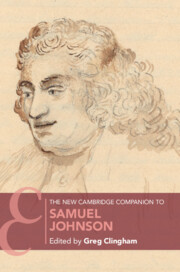Book contents
- The New Cambridge Companion to Samuel Johnson
- The New Cambridge Companion to Samuel Johnson
- Copyright page
- Contents
- Figures
- Contributors
- Short Titles and Note on the Text and Cover Art
- Introduction: Contemporary Johnson
- Chapter 1 Johnson, Ethics, and Living
- Chapter 2 Johnson and the Essay
- Chapter 3 Johnson and Renaissance Humanism
- Chapter 4 Johnson and Language
- Chapter 5 Johnson and British Historiography
- Chapter 6 Johnson and Fiction
- Chapter 7 Johnson and Gender
- Chapter 8 Johnson, Race, and Slavery
- Chapter 9 Johnson’s Politics
- Chapter 10 Johnson’s Poetry
- Chapter 11 Johnson’s Editions of Shakespeare
- Chapter 12 Johnson’s Lives of the Poets: A Guided Tour
- Chapter 13 Johnson as Biographer
- Chapter 14 Johnson and Travel
- Chapter 15 Johnson and Disability
- Chapter 16 Representing Johnson in Life and After
- Chapter 17 Johnson among the Scholars
- Further Reading
- Index
- Cambridge Companions To …
Chapter 9 - Johnson’s Politics
Published online by Cambridge University Press: 22 September 2022
- The New Cambridge Companion to Samuel Johnson
- The New Cambridge Companion to Samuel Johnson
- Copyright page
- Contents
- Figures
- Contributors
- Short Titles and Note on the Text and Cover Art
- Introduction: Contemporary Johnson
- Chapter 1 Johnson, Ethics, and Living
- Chapter 2 Johnson and the Essay
- Chapter 3 Johnson and Renaissance Humanism
- Chapter 4 Johnson and Language
- Chapter 5 Johnson and British Historiography
- Chapter 6 Johnson and Fiction
- Chapter 7 Johnson and Gender
- Chapter 8 Johnson, Race, and Slavery
- Chapter 9 Johnson’s Politics
- Chapter 10 Johnson’s Poetry
- Chapter 11 Johnson’s Editions of Shakespeare
- Chapter 12 Johnson’s Lives of the Poets: A Guided Tour
- Chapter 13 Johnson as Biographer
- Chapter 14 Johnson and Travel
- Chapter 15 Johnson and Disability
- Chapter 16 Representing Johnson in Life and After
- Chapter 17 Johnson among the Scholars
- Further Reading
- Index
- Cambridge Companions To …
Summary
This chapter contributes to the debates about Samuel Johnson’s politics by considering the inadequacy of “Tory” as a label as balanced by Johnson’s unique contribution to the British public sphere in light of his determination to oppose aggressive forms of cultural nationalism. Considering Johnson’s journalism, his critical biographies, and Rasselas, Hawes explores Johnson’s deliberate cultivation of an anti-colonial perspective that burst through the usual framework for public discussions of the Seven Years War. In opposing the “Whig interpretation of history,” Johnson set himself against the principal vector of expansionist ideology. In his ability to combine anti-slavery and anti-colonial positions, Hawes argues, Johnson is uniquely prescient – and sometimes politically quite radical. His politics need to be understood as specifically anti-colonial, often reframing discussions of supposedly national affairs as manifestations of a colonial agenda.
Keywords
- Type
- Chapter
- Information
- The New Cambridge Companion to Samuel Johnson , pp. 121 - 134Publisher: Cambridge University PressPrint publication year: 2022

